The port town of Campbeltown and the Isle of Islay
Page 43
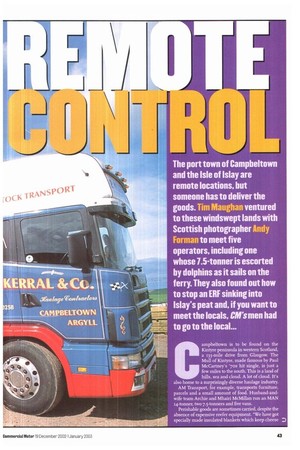
Page 44
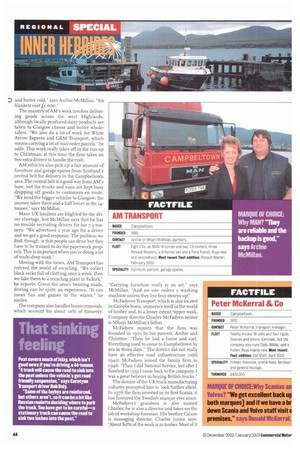
Page 45
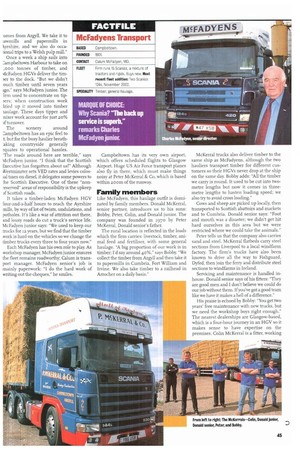
Page 46
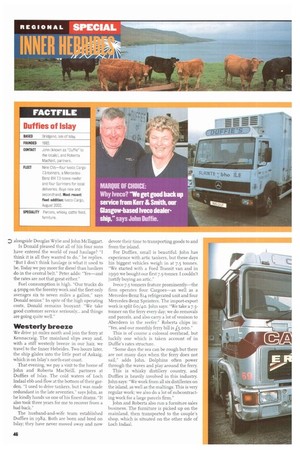
Page 47
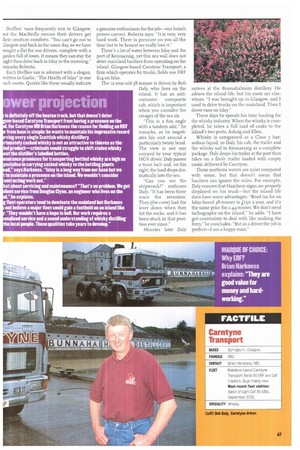
If you've noticed an error in this article please click here to report it so we can fix it.
are remote locations, but someone has to deliver the goods. Tim Maughan ventured to these windswept lands with Scottish photographer Andy Forman to meet five operators, including one whose 7.5-tonner is escorted by dolphins as it sails on the ferry. They also found out how to stop an ERF sinking into Islay's peat and, if you want to meet the locals, CM's men had to go to the local...
ampbeltown is to be found on the Kintyre peninsula in western Scotland, a 133-mile drive from Glasgow. The Mull of Kintyre, made famous by Paul McCartney's '70s hit single, is just a few miles to the south. This is a land of hills, sea and cloud. A lot of cloud. Its also home to a surprisingly diverse haulage industry.
AM Transport, for example, transports furniture, parcels and a small amount of food. Husband-and wife team Archie and Mhairi McMillan run an MAN 14-tonner, two 7.5-tonners and five vans.
Perishable goods are sometimes carried, despite the absence of expensive reefer equipment. We have got specially made insulated blankets which keep cheese 0 and butter cold," says Archie McMillan. "Six blankets cost Li,000."
The majority of AM's work involves delivering goods across the west Highlands, although locally produced dairy products are taken to Glasgow cheese and butter wholesalers. "We also do a lot of work for White Arrow Express and G&M Transport, which means carrying a lot of mail order parcels," he adds. This work really takes off in the run-up to Christmas: at this time the firm takes on two extra drivers to handle the rush.
AM vehicles also pick up a fair amount of furniture and garage spares from Scotland's central belt for delivery in the Campbeltown area. The central belt is a good way from AM's base, but the trucks and vans are kept busy dropping off goods to customers en route. "We send the bigger vehicles to Glasgow; the journey takes three-and-a-half hours in the 14tonner," says McMillan.
Many UK hauliers are blighted by the driver shortage, but McMillan says that he has no trouble recruiting drivers for his 7.5-tonners: "We advertised a year ago for a driver and we got a good response. The problem we find, though, is that people can drive but they have to be trained to do the paperwork properly, This is important when you're doing a lot of multi-drop work."
Moving with the times, AM Transport has entered the world of recycling. "We collect black sacks full of clothing once a week, then we take them to a recycling plant in Falkirk," he reports. Given the area's twisting roads, driving can be quite an experience. It can mean fun and games in the winter," he smiles.
The company also handles house removals, which account for about io% of turnover: "Carrying furniture really is an art," says McMillan, "And no one orders a washing machine unless they live four storeys up!"
McFadyens Transport, which is also located in Campbeltown, immerses itself in the world of timber and, to a lesser extent, tipper work. Company director Charles McFadyen senior is Mhairi McMillan's father.
McFadyen reports that the firm was founded in 19o1 by his parents, Archie and Christine: "Then he had a horse and cart. Everything used to come to Campbeltown by sea in those days." The district did not really have an effective road infrastructure until 1940; McFadyen joined the family firm in 1946: "Then I did National Service, but after I finished in 1953 I came back to the company. I was a great believer in buying British trucks."
The demise of the UK truck manufacturing industry prompted him to look further afield. In 1976 the firm invested in its first Scania; it has favoured the Swedish marque ever since.
McFadyen's grandson is also named Charles; he is also a director and takes on the job of workshop foreman. His brother Calum is managing director. Charles junior says: "About 8o% of the work is in timber. Most of it :omes from Argyll. We take it to .awmills and papermills in kyrshire, and we also do occadonal trips to a Welsh pulp mill."
Once a week a ship sails into Ilanipbeltown Harbour to take on
,000 tonnes of timber, and FLEET vIcFadyen HGVs deliver the timer to the dock. "But we didn't ouch timber until seven years igo," says McFadyen junior. The irm used to concentrate on tip)ers; when construction work iried up it moved into timber iaulage. These days tipper and nixer work account for just 20%
turnover.
The scenery around 17ampbeltown has an epic feel to t, but for the busy haulier breath:alcing countryside generally !gages to operational hassles. 'The roads around here are terrible," says qcFadyen junior. "I think that the Scottish Executive has forgotten about us!" Although Westminster sets VED rates and levies colos;al taxes on diesel, it delegates some powers to :he Scottish Executive. One of these "nonreserved" areas of responsibility is the upkeep pf Scottish roads.
It takes a timber-laden Mcfadyen HGV Four-and-a-half hours to reach the Ayrshire mills, by way of lot of twists, undulations, and potholes. It's like a war of attrition out there, and lousy roads do cut a truck's service life. McFadyen junior says: "We used to keep our trucks for 12 years, but we find that the timber work is hard on the vehicles so we change the timber trucks every three to four years now."
Each McFadyen has his own role to play. As workshop manager, McFadyen junior ensures the fleet remains roadworthy; Calum is transport manager. McFadyen senior's job is mainly paperwork: "I do the hard work of writing out the cheques," he smiles. Campbeltown has its very own airport, which offers scheduled flights to Glasgow Airport. Huge US Air Force transport planes also fly in there, which must make things noisy at Peter McKerral & Co, which is based within zoom of the runway.
Family members
Like McFadyen, this haulage outfit is dominated by family members. Donald McKerral, senior partner, introduces us to his sons: Bobby, Peter, Colin, and Donald junior. The company was founded in 1970 by Peter McKerral, Donald senior's father.
The rural location is reflected in the loads which the firm carries: livestock, timber, animal feed and fertiliser, with some general haulage. "A big proportion of our work is in timber; I'd say around 40%," says Bobby. "We collect the timber from Argyll and then take it to paperm ills in Cumbria, Fort William and Irvine. We also take timber to a railhead in Arrocher on a daily basis." McKerral trucks also deliver timber to the same ship as McFadyens, although the two hauliers transport timber for different customers so their HGVs never drop at the ship on the same day. Bobby adds: "All the timber we carry is round. It used to be cut into twometre lengths but now it comes in threemetre lengths to hasten loading speed; we also try to avoid cross loading."
Cows and sheep are picked up locally, then transported to Scottish abattoirs and markets and to Cumbria. Donald senior says: "Foot and mouth was a disaster; we didn't get hit hard ourselves in this area but we were restricted where we could take the animals."
Peter tells us that the company also carries sand and steel. McKerral flatbeds carry steel sections from Liverpool to a local windfarm factory. The firm's trucks have also been known to drive all the way to Fishguard. Dyfed. then join the ferry and distribute steel sections to windfarms in Ireland.
Servicing and maintenance is handled inhouse. Donald senior says of his fitters: "They are good men and I don't believe we could do our job without them. Ifyou've got a good team like we have it makes a hell of a difference."
His praise is echoed by Bobby: "You get two years' free maintenance with new trucks, but we need the workshop boys right enough.' The nearest dealerships are Glasgow-based, which is a four-hour journey in an HGV so it makes sense to have expertise on the premises. Colin McKerral is a fitter, working alongside Douglas Wylie and John McTaggart.
Is Donald pleased that all of his four sons have entered the world of road haulage? "I think it is all they wanted to do," he replies. "But I don't think haulage is what it used to be. Today we pay more for diesel than hauliers do in the central belt." Peter adds: "Yes—and the rates are not that great either."
Fuel consumption is high. "Our trucks do 4.5mpg on the forestry work and the fleet only averages six to seven miles a gallon," says Donald senior." In spite of the high operating costs, Donald remains buoyant: "We take good customer service seriously.., and things are going quite well."
Westerly breeze
We drive 30 miles north and join the ferry at Kennacraig. The mainland slips away and, with a stiff westerly breeze in our hair, we travel to the Inner Hebrides. Two hours later, the ship glides into the little port of Askaig, which is on Islay's north-east coast.
That evening, we pay a visit to the home of John and Roberta MacNeill, partners at Duffles of Islay. The cold waters of Loch Indaal ebb and flow at the bottom of their garden. "I used to drive tankers, but I was made redundant in the late seventies," says John, as he kindly hands us one of his finest drams. "It also took three years for me to recover from a bad back."
The husband-and-wife team established Duffles in 1982. Both are born and bred on Islay; they have never moved away and now devote their time to transporting goods to and from the island.
For Duffles, small is beautiful. John has experience with artic tankers, but these days his biggest vehicles weigh in at 7.5 tonnes. "We started with a Ford Transit van and in 1990 we bought our first 7.5-tonner. I couldn't justify buying an a rtic."
Iveco 7.5 tonners feature prominently—the firm operates four Cargoes—as well as a Mercedes-Benz 814 refrigerated unit and four Mercedes-Benz Sprinters. The import-export work is split 60/40. John says: "We take a 7.5tonner on the ferry every day; we do removals and parcels, and also carry a lot of venison to Aberdeen in the reefer." Roberta chips in: "Yes, and our monthly ferry bill is £5,000."
This is of course a colossal overhead, but luckily one which is taken account of in
Duffie's rates structure.
"Some days the sea can be rough but there are not many days when the ferry does not sail," adds John. Dolphins often power through the waves and play around the ferry.
This is whisky distillery country, and Duffles is heavily involved in this industry. John says: "We work from all six distilleries on the island, as well as the maltings. This is very regular work; we also do a lot of subcontracting work for a large parcels firm."
John and Roberta also run a furniture sales business. The furniture is picked up on the mainland, then transported to the couple's shop, which is situated on the other side of Loch I ndaal. Duffles' vans frequently run to Glasgow. nit the MacNeilIs ensure their drivers get heir creature comforts. "You can't go out to "Aasgow and back in the same day, so we have >ought a flat for our drivers, complete with a ;arden full of roses. It means they can stay the light then drive back to Islay in the morning," :ernarlcs Roberta.
Each Duffles van is adorned with a slogan, written in Gaelic: "The Health of Islay" is one ;uch motto. Quirks like these usually indicate a genuine enthusiasm for the job—our hunch proves correct. Roberta says: "It is very, very hard work. There is pressure on you all the time but to be honest we really love it."
There's a lot of water between Islay and the port of Kennacraig, yet this sea wall does not deter mainland hauliers from operating on the island. Glasgow-based Car ntyne Transport, a firm which operates 80 trucks, fields one ERF Ei4 on Islay.
The iz-year-old 38-tonner is driven by Bob Daly, who lives on the island. It has an anti corrosive composite cab, which is important when you consider the ravages of the sea air.
"This is a fun angle with a tandem axle," he remarks, as he negotiates his unit around a particularly twisty bend. The view is not one enjoyed by your typical HGV driver. Daly passes a trout loch and, on his right, the land drops dramatically into the sea.
"Can you see the shipwreck?" enthuses Daly. "It has been there since the seventies. They (the crew) had the lever down when they hit the rocks, and it has been stuck in that position ever since."
Minutes later Daly arrives at the Bunnahabriain distillery. He adores the island life, but his roots are elsewhere. "I was brought up in Glasgow, and I used to drive trucks on the mainland. Then I drove vans on Islay."
These days he spends his time hauling for the whisky industry. When the whisky is completed, he takes a full load of casks to the island's two ports, Askaig and Ellen.
Whisky is categorised as a Class 3 hazardous liquid, so Daly, his cab, the trailer and the whisky sail to Kennacraig as a complete package. Daly drops his trailer at the port then takes on a fresh trailer loaded with empty casks, delivered by Carntyne.
These northern waters are quiet compared with some, but that doesn't mean that hauliers can ignore the rules. For example, Daly ensures that Hazchem signs are properly displayed on his truck—but the island life does have some advantages: "Road tax for an Islay-based 38-tonner is L150 a year, and it's the same price for a 44-tonner. We don't need tachographs on the island," he adds. "I have got constraints to deal with like making the ferry" he concludes. "But as a driver the job is perfect—I am a happy man."
AM TRANSPORT
BASED Campbettown.
FOUNDED 1985
comet Archie or Mhairi McMillan, partners.
REET Eight CVs: an MAN 14-tonner and two 7.5-tonners, three
Renault Masters, a 9-Sprles van and a nr.c1 Transit. Buys new and secondhano. Most recent fleet addition: Renault Master, February 2002.
SPECIALITY Furniture, parcels, garage spares.
ihat sinking,
feelinf
Peat covers much of Islay. which isn't good news if you're driving a 4.4-tanner. "A truck will cause the road to sink into the peat unless the vehicle's got road friendly suspension." says Carntyne Transport driver Bob Daly.
"Some of the laybys are reinforced, but others aren't, so it can be a bit like Russian roulette deciding where to part the truck. You have got to be careful—a stationary truck can cause the road to sink two inches into the peat."
FACTFILE Peter McKerral & Co
BASED Campbeltown.
FOUNDED 1970.
CONTACT Peter McKerral, transport manager.
FLEET Twenty trucks; 16 units and four rigids.
Scanias and Volvos dominate, but the company also runs Oafs, MANs, and a Foden. Buys mainly new. Most recent fleet addition: Oaf 95XF, April 2002.
SPECIALITY Timber, livestock, animal feed, fertiliser and general haulage.
TURNOVER 2400,000.
MARQUE OF CHOICE: Why Scanias an Volvos? "We get excellent back up both marques] and if we have a hr down Scania and Volvo staff visit a premises."
FACTFILE McFadyens Transport
BASED Campbeltown.
FOUNDED 1901.
CONTACT Calm McFadyer, MD.
Firm runs 15 Scanias, a mixture of tractors and rigids. Buys new. Most recent fleet addition: Two Scanias 124s, November 2002.
SPECIALITY Timber, general haulage.
MARQUE OF CHOICE: Why Scania? "The back up service is superb." remarks Charles McFadyen junior.
racTrILE
Duffles of Islay
BASED Bridgend, Isle of Islay.
FOUNDED 1982.
CONTACT John (known as 'Duffle" to the locals), and Roberta MacNeill, partners.
FLEET Nine CVs—four lveco Cargo
7.5-tonners, a MercedesBenz 814 7.5-tonne reefer and four Sprinters for local deliveries, Buys new and secondhand. Most recent fleet addition: lveco Cargo, August 2002.
SPEMAUTY Parcels, whisky, cattle feed, furniture.
MARQUE OF CHOICE:
Why Iveco? "We get good back up service from Kerr & Smith, our Glasgow-based New dealership," ,.ayt. JOH Dine.
lwer projection
is definitely off the hearten track, but that doesn't deter . ow-based Carntyne Transport from having a presence on the d. For Carntyne MD Brian Harkness the reason for fielding an HGV r from base is simple: he wants to maintain his impressive record rving every single Scottish whisky distillery rtunately cashed whisky is not as attractive to thieves as the led product—criminals would struggle to shift stolen whisky out the distiller's labelled bottles.
nsurance premiums for transporting bottled whisky are high so pecialise in carrying casked whisky to the bottling plants ad," says Harkness. "Islay is a long way from our base but we to maintain a presence on the island. We wouldn't consider ontracting work out."
hat about servicing and maintenance? "That's no problem. We get Bent service from Douglas Clyne, an engineer who lives on the d," he explains.
g fleet operators tend to dominate the mainland but Harkness not believe a mator fleet could gain a foothold on an island like : "They wouldn't have a hope in hell. Our work requires a onalised service and a sound understanding of whisky distilling the local people. These qualities take years to develop."
MARQUE Of CHOICE: Why ERR Brian Harkness explains: "They are good value for money and hardworking."
FACTFILE Carntyne Transport
BASED Soringburn, Glasgow.
FOUNDED 1957.
CONTACT Brian Harkness, MD.
FLEET Mainland-based Carntyne
Transport fields 90 ERF and Oaf tractors. Buys mainly new. Most recent fleet addition: Batch of eight Oaf 85 430s, September 2002.
SPECIALITY Whisky
































































































































































